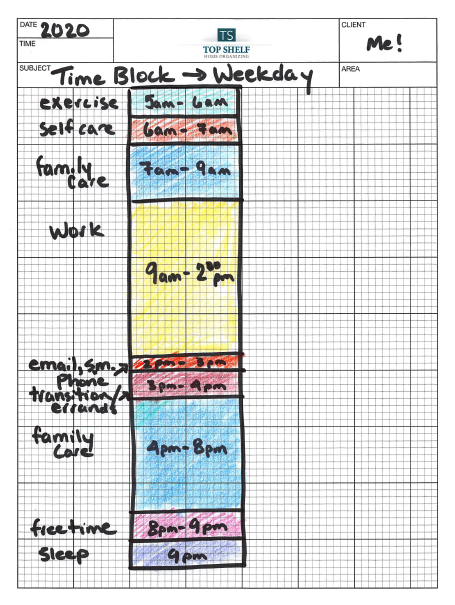
by Jayme Radomski | Aug 11, 2025 | Busyness, Cleaning, Closets, Clutter, Digital, Managing Time, Money & Paper Management, Organizing
As the final weeks of summer unfold, it’s the perfect time to pause, reflect, and set yourself up for a smooth transition into fall. Whether you’re preparing for a new school year, gearing up for a busy work season, or simply craving a more organized lifestyle, August offers a unique opportunity to reset. Before the routines of September return, take advantage of the slower pace and longer days to focus on these five areas of life that often need a little attention.
1. ⏰ Your Daily Routines
Summer often brings a welcome disruption to our usual schedules—but that flexibility can make it harder to return to structured routines in the fall. Use this month to gently realign your morning and evening habits:
• Start waking up and going to bed closer to your fall schedule.
• Review your current routines—what’s working, what’s not, and what can be simplified?
• Set time aside for planning your day or week ahead to reduce decision fatigue later.
Organizing your routines now will help you feel less overwhelmed when your calendar fills back up.
2. 💻 Your Digital Life
Digital clutter builds up fast—and unlike physical messes, it’s easy to ignore. Take a few hours this month to:
• Clear out your email inbox.
• Organize and back up your photos.
• Clean up your desktop, downloads folder, and apps you no longer use.
• Review subscriptions and delete what you don’t need.
A refreshed digital space can improve focus and help you feel more in control as you head into a busier season.
3. 🚪 Your Home Entry Points
The spaces that greet you when you enter or leave your home—like your mudroom, entryway, garage, or hallway closet—often get chaotic during the summer. Sandals, sunscreen, backpacks, and sports gear pile up. Take time to:
• Sort and store summer gear you won’t need daily.
• Designate spots for keys, bags, and shoes.
• Make room for back-to-school or fall essentials (think: jackets, lunch boxes, or umbrellas).
These high-traffic areas set the tone for your whole home—keeping them organized helps reduce stress.
4. 📅 Your Calendar and Commitments
The shift from summer freedom to fall obligations can feel jarring. Avoid calendar chaos by getting ahead now:
• Block out important dates (school starts, work deadlines, holidays, appointments).
• Reassess commitments—do they align with your goals and values?
• Make room for downtime, too.
An organized calendar empowers you to say “yes” to what matters and “no” to what drains you.
5. 🎯 Your Personal Goals
Remember those goals you set in January? Now’s a great time to check in and refocus:
• Review what you’ve accomplished and what still feels meaningful.
• Choose 1–2 realistic goals to work on before the end of the year.
• Break them into small steps and schedule time to act on them.
Organizing your goals keeps you motivated and intentional—especially before the rush of the holiday season begins.
The last month of summer doesn’t have to be all about winding down—it can be a launchpad. With a little time and intention, organizing these key areas will help you feel more grounded, productive, and ready for what’s ahead. So pour a glass of iced tea, grab a notebook, and give your life a little summer tune-up—you’ll thank yourself in September. Top Shelf Home Organizing would love help you finish the summer with peace.
by Jayme | Nov 1, 2021 | Busyness, Clutter, Organizing
 Decluttering is one of the first steps to an organized home. The emotions that emerge when sifting through items in your home can overtake your motivation to declutter. We all experience emotions when working through items acquired through our life experiences. Hope, fear, guilt and emotional attachment may prevent us from decluttering our homes. Identifying, understanding, and overcoming these emotions will help you create the peaceful home you desire.
Decluttering is one of the first steps to an organized home. The emotions that emerge when sifting through items in your home can overtake your motivation to declutter. We all experience emotions when working through items acquired through our life experiences. Hope, fear, guilt and emotional attachment may prevent us from decluttering our homes. Identifying, understanding, and overcoming these emotions will help you create the peaceful home you desire.
Here are some key areas to consider to help overcome these strong emotions.
Setting Small Goals
Have you started to declutter in the past, but the project was too overwhelming? When emotions arise, cutting the clutter can be nearly impossible to tackle. Breaking the process down in steps or a method can make the project manageable and reduce overwhelm. Instead of telling yourself you are going to organize the basement this weekend, set the goal of gathering one category of items. Getting all items together is a task that is clearly defined and does not bring on the overwhelm of the entire organizing process.
Gathering tools, pants, or pots and pans feels much more manageable than getting an entire room organized in one weekend. Once a category is gathered, set the next goal of sorting the category. Dividing the items into: need/love, don’t need/dislike, and might use/its okay categories is a task that can be completed in a reasonable time. Breaking down the individual tasks in an organizing project will help reduce overwhelm.
Letting Go
The things in our home and life arrived because of a life event. Revisiting these items may bring back memories. A college backpack, an engraved pen set, wedding dress, handwritten notes and cards, artwork, sporting goods, or tools and crafts were acquired at a time of life when there was an accomplishment, celebration, or a life change. It was a big time in your life. An array of emotions may surface when approaching these things making you feel the need to keep the items. Understand these items are not who you are. Your life experiences have shaped who you are today, not the stuff. Letting go of items will not change who you are, what you have experienced, or what you have accomplished.
Fear
The emotion of fear prevents us from decluttering our homes. We keep items because they offer a sense of security. Fear may exist because you feel you may not have the resources someday to purchase the items or the items may not be available.
The first step in overcoming this fear is understanding if you will even need or use the item someday. You may be hanging on to hobby items you will not have the time or physical ability to use again, but fear if you get rid of them, you may not have the resources to purchase them again. You may have a pantry full of expired food because you fear you may not have the resources someday to buy food. You may fear you will hurt someone if you donate the wedding gift they gave you. Understanding why you are afraid of purging the things in your home can help you overcome the fear and be realistic about what you keep in your home.
Would You Buy It Today?
Ask yourself if you would buy the item today. This question is great when you are decluttering household items, personal care items, and clothing. If you were to make a decision on whether to purchase a particular item right now, would you? Would you purchase that kitchen gadget, lipstick, or clothing item you have in your closet today? You may have truly enjoyed the item at one time. Maybe you believed the item would make you more efficient in the kitchen. If your answer to this question today is anything but “yes,” the items do not have a place in your home.
At Top Shelf Home Organizing, we love to help busy households get organized. If you are looking for guidance on getting your home organized, reach out to Jayme.
by Jayme Radomski | Oct 22, 2020 | Busyness, Clutter, Managing Time, Organizing, Productivity, Saving Time
 I was recently asked by an organization I belong to, to share my inspiration to start a business. I then realized what a better audience than all of you to share that inspiration with, as well.
I was recently asked by an organization I belong to, to share my inspiration to start a business. I then realized what a better audience than all of you to share that inspiration with, as well.
Top Shelf Home Organizing started in 2014 after having a discussion with friends about what our dream job would be if we could do anything. After watching all their jaws drop when I said I would organize people’s closets and basements, I knew there was a need. Since then, my business has been effectively helping people organize their homes and offices, simplify their routines, and clear their schedules. I am personally involved in all projects and have six wonderful ladies that help on various projects.
We help busy families with projects that range from pantry organizing projects to full-home, plus storage units. Some individuals just need the accountability to get through an organizing project, and others need full-service help where we handle the complete organizing project.
I have always had a bit of an entrepreneurial mind. Going back to babysitting jobs, waiting tables, and working as a consulting engineer, I always tracked the time I spent on a project, the revenue each project brought in, how my job could be done more efficiently, and what types of projects brought the most value. I treated projects like my own little business.
After 15 years of professional experience working in various leadership roles, I knew it was time to do something I was passionate about. My youngest of four kids was about six months old, and I was in the thick of balancing parenting and a career. So I knew my skill set would be valuable to other busy professionals.
My favorite part of Top Shelf Home Organizing is the clients. It can be a very personal thing helping them to organize their home, basement, or closet. I often hear stories from their childhood, past careers, current life struggles, and their aspirations. It is not uncommon to get a message from a client on a Sunday afternoon asking how my kids are, how big our puppy is, or asking for a recommendation on a carpenter, decorator, or just a simple hello. Clients become friends.
If you want to learn more about Top Shelf Home Organizing or just want to chat about an organizing project you have going, you can find me at:
Phone: 262-373-9416
Email: jayme@topshelfhomeorganziing.com
Web: topshelfhomeorganizing.com
Facebook: https://www.facebook.com/topshelfhomeorganizing
Pinterest: https://www.pinterest.com/TopShelfHomeOrg/
Instagram: www.instagram.com/jaymeradomski
by Jayme Radomski | Feb 12, 2020 | Busyness, Managing Time, Productivity, Saving Time

You should protect your time with time blocking, regardless of your responsibilities. Whether you are a busy professional well into your career, a full-time caregiver to your family, or just juggling many responsibilities, blocking your time will set boundaries around your professional and personal time and allow you to maximize your productivity.
Blocking your time is a written reminder of where you need be, literally and mentally, at any time of the day. Time blocking allows you to focus deeply on the task that needs to be completed. For example, when you have time blocked for self care in your schedule, all you need to focus on in the self care time block is caring for yourself. Just like budgeting your money, time blocking makes you aware of how you spend your time (and where you waste your time). Time blocking is a written commitment to what you spend your time on.
To start time blocking, make a list of your daily tasks, this is a high level list. Each task may have multiple sub-tasks within it. We will address these later. This is just a list of what you should do everyday. As an example, here is a list of Jayme’s daily tasks. Included in the list are a couple items I would like to make time for (reading, a hobby and free time).
- Sleep
- Self care
- Family care
- Reading
- Exercising
- Work
- Email, Social Media
- Planning for tomorrow
- Free time
- Hobby
Combine smaller tasks into a task batch. Task batching is grouping smaller tasks into one chunk of time. This could include checking and responding to email, returning phone calls and checking social media. Another batch may include a few items that are complete during some personal time (reading, hobby and free time). A morning routine could also be batched, as these events naturally occur together and fit into a schedule by design (self care, family care and exercise). In this example, family care is also a batch. Family care may include cooking, mealtime, bathing, homework help, and carpooling.
Your work time is naturally where you would task batch items you need to complete to make money. Notice I wrote, “make money.” This is where you mark your time as busy to focus on the items that eventually pay your bills. You tell your assistant or whoever you work with that your door is closed, and non-critical family chats and conversations can wait. This is the time you focus on your work. There are other times of your day where you may mark yourself busy, as well. These times may be when you are physically not available such as sleep and exercise.
Day theming works well if you have large portions in each day that you need to dedicate to different areas to meet the same goal. For example, if you work from 9am to 3pm each day, you may want to dedicate one day for client meetings and client follow up, another day for writing, another day for administrative tasks, and two other days for marketing. If you have projects, there are days of the week you may need to dedicate to the one or many projects you have going on.
Time blocking takes planning and revisions. Your initial plan for a time block may need to be revised frequently in the beginning. Give yourself some grace. If you are not seasoned to planning your day, keep it very simple in the beginning and allow flexibility. Life if going to happen and your schedule may go astray. You will find peace though knowing that there is a daily plan, and if you stick to the plan productivity will happen. As your productivity increases and evolves, you will find more free time in your day and your week.
Time blocking can be done with a simple paper calendar or planner, or with an online calendar or application. I would recommend starting with a simple paper and pencil to plan your time. After getting used to the idea of scheduling your time into blocks, try a digital calendar or app where you can experiment with colors and tags.
If planning your time causes you stress and anxiety, Top Shelf Home Organizing would love to help you on your journey. Jayme can help you plan your time blocking, set your goals, and keep you accountable to meeting those goals.
by Jayme Radomski | Jul 3, 2018 | Busyness, Clutter
 Getting organized will save you time and money. Here are six ideas on how this can really happen.
Getting organized will save you time and money. Here are six ideas on how this can really happen.
- Meal Planning
When you plan meals, you spend less money at the store (or eliminate a trip to the grocery store altogether), eat healthier and waste less food. Having a plan prevents impulse purchases of overpriced convenience food and last minute carryout meals. When you know what food you have in your pantry, you can build meal plans around the ingredients you already have.
- Sell your clutter
Sell the items you no longer use or love, and the items you have multiples of. In addition to making a little cash, you will love the extra space to breathe.
- Limit repeat purchases
Getting organized helps you keep track of what you own so you don’t run out to purchase something that you can’t find. Like items get placed with like items… you’ll soon discover how many bottles of sunscreen and kitchen spatulas you actually own.
- Late fees vs. discounts
You’ll avoid late fees, and you’ll be able to see new ways you could save on your expenses. Instead of spending time trying to settle delinquent bills, you can ask your providers for discounts for being a good customer. Being on top of bills and due dates will keep your budget on track.
- Save time
Once you’re more organized, you will spend less time trying to find things and making multiple runs to the store. You can use that extra time for to be more productive, make more money to pay off your debts or add to your savings. Also, once you realize what you own, you will less likely go out shopping. This will save time, money and gas… double bonus!
- You’ll discover more ways to save
Once you get rid of the clutter in your house, you’ll free your mind up to figure out more ways to cut back or earn more. You will also see how little you really need, realizing you do not need to shop.
If planning and orgainzing are overwhelming, a professional organizer can help. See if Top Shelf Home Organizing can help you on your journey. Contact Jayme to schedule a consult or chat about organizing.
by Jayme Radomski | Jun 5, 2018 | Busyness, Productivity, Work & Home Office
 Productivity is all about being efficient and accomplishing more in less time. Schedule your day to be the most efficient you can be by having a plan for every day.
Productivity is all about being efficient and accomplishing more in less time. Schedule your day to be the most efficient you can be by having a plan for every day.
Here are a few tips to make the most of your day whether you work in your home, run a business, or work for a large company.
- Difficult Tasks
Schedule your most difficult, undesirable tasks for the time of day when you are most focused. For many, this time is first thing in the morning. And doesn’t if feel good to get it out of the way?
- Meetings
Prepare, review and stick to a meeting agenda to ensure everyone stays on topic. Issues that may come up during a meeting can wait to be discussed at a later time with only the people involved. Set up video conferencing equipment ahead of the meeting so you can tackle the agenda on time and save everyone valuable minutes with each meeting.
- Communication
Schedule a couple times in your day where you devote time to checking and responding to emails, voicemails and messages. Having a set time to do this will help you avoid being interrupted throughout the day, and keep you focused on the project you intend to accomplish. Also, use the phone to communicate more often versus the never ending back and forth of email and other messaging communications.
- Breaks
Schedule blocks of breaks throughout your day to keep your mind fresh.
- Me Time
Schedule me time every day. Taking time first thing in the morning to focus on your health and faith will get your day off to a good start.
- Checklists
Use a checklist for daily repetitive tasks. This will keep you focused and help minimize errors in the tasks you do everyday. Also, create a weekly checklist to help keep your week on task, so you can accomplish your goals. Create your weekly checklist at the end of the previous work week so your week is off to a strong, focused start.
- Work Space
Keep your work space neat and organized to ensure focus. Keep only the current project on your desk. If it makes sense, plan certain tasks to be completed offsite or at home. Offsite work allows for focus without the office interruptions and can save commute time.
If scheduling and organizing are challenging, a professional organizer can help. See if Top Shelf Home Organizing can help you on your journey. Contact Jayme to schedule a consult or chat about organizing.







